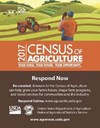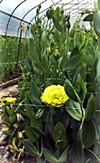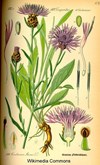 Cooperative Extension regional agriculture programs are the result of unique partnerships that provide opportunities to commercial producers beyond their individual counties’ borders. These ag teams present educational programs on a wide variety of topics, consult with commercial farmers and producers in a timely manner on specific technical issues, provide on-site visits when necessary and provide assitance to beginning farmers in addition to those making production changes.
Find team members, their specific areas of expertise, and contact information on the download below.  Download File Download File
Full-time & part-time farmers, farm workers, agribusnesses, rural landowners and others interested in maintaining strong agriculture in our area read the Agricultural News. You can, too, for only $12 per year.
Gardeners, homeowners and others interested in various aspects of agriculture, youth and consumer education also read and contribute to this publication.
Download the subscription form below and feel free to share one with a friend or neighbor.  Download File Download File
 Emergency responder information on pesticide spills and accidents: CHEMTREC: 800-424-9300
For pesticide information: National Pesticide Information Center: 800-858-7378
To Report Oil and Hazardous Material Spills in New York State: NYS Department of Environmental Conservation Spill Response - 800-457-7362 (in NYS), 518-457-7362 (outside NYS)
Poison Control Centers: Poison Control Centers nationwide: 800-222-1222 If you are unable to reach a Poison Control Center or obtain the information your doctor needs, the office of the NYS Pesticide Coordi-nator at Cornell University, 607-255-1866, may be able to assist you in obtaining such information.
|
Posted 3/1/2018
Upcoming Event! Pesticide Recertification Day March 1, 2018, 8:00 AM - 4:00 PM
Posted 2/26/2018
February 26 – April 2, 2018, Improved Grazing Management (BF 231) Webinars every Monday evening 6:30-8pm Eastern time. Webinars will be recorded for later viewing. An online course from the Cornell Small Farms Program. Fee for this course is $250. Sign up a month or more in advance of the start date and receive $25 off. Sign up for three or more courses and receive $50 off your total. For more information and to register: http://bit.ly/2noTghM Grazing is more than simply turning livestock out onto a green “warehouse” and hoping for the best. With sound grazing management, you can reduce your workload, keep your animals happier and healthier, and improve the overall productivity and profitability of your farm. Well-managed grazing systems also provide greater environmental benefits and enhance habitat for many wildlife species.
Posted 2/20/2018
February 20 & 21, 2018, Eastern NY Fruit & Vegetable Conference
Desmond Conference Center, 660 Albany Shaker Road, Albany, NY Register before February 13, 2018 for a reduced rate! Hot Lunch and admission to the trade show are included with the registration fee. DEC Credits will be available in the Tree Fruit, Vegetable, and Small Fruit Sessions. Register at https://enych.cce.cornell.edu/event.php?id=881 This two-day conference combines all of ENYCHP's traditional fruit and vegetable meetings into one large event in the Capital Region. Sessions will include two full days of tree fruit programming, one day of vegetable programming, a half day berry session and a half day business management session.
Posted 2/15/2018
February 15, 2018, The Five Keys to Success, Farm Transition Planning Webinar 1:00pm ESTTo regiser: https://register.gotowebinar.com/register/4639368810852081665 This important and informational webinar is free. Farm Transition Planning is a topic every ag business farm owner/operator will have to face as they wind down their career. It is also an easy topic to put off to “someday”. Addressing this topic in a timely, proactive manner will allow you to guide the future of your operation – and YOUR future – in a more positive way. Join Farm Credit East Business Consultant Jon Jaffe on at, as he discusses the “five hurdles” you need to overcome to successfully transition your ag business. Jon is a 34 year Farm Credit veteran who has focused his consulting career on this topic. He has taught farm succession schools in all six New England states, led a number of seminars on this topic and has worked directly with more than one hundred farm families.
Posted 2/5/2018
Cornell Crop and Pest Management Guidelines The Cornell Guidelines are designed as a practical guide for producers, consultants, educators, pesticide dealers, and others involved in producing agricultural crops. Cornell Guidelines can be purchased through any Cornell Cooperative Extension office or from the Cornell Store at Cornell University. To order from the Cornell Store, call (844) 688-7620 or order online.
Posted 2/1/2018

The Census of Agriculture is a Producer's Voice, Future, and Opportunity. In December farmers and ranchers across the nation received the 2017 Census of Agriculture. Producers can mail in their completed census form, or respond online via the improved web questionnaire. The online questionnaire has been revised extensively to make it more convenient for producers. Conducted once every five years, the census of agriculture is a complete count of all U.S. farms, ranches, and those who operate them; it is the only source of uniform, comprehensive, and impartial agriculture data for every state and county in the nation. Farmers and ranchers, trade associations, government, extension educators, researchers, and many others rely on census of agriculture data when making decisions that shape American agriculture – from creating and funding farm programs to boosting services for communities and the industry. For more information about the 2017 Census of Agriculture, visit www.agcensus.usda.gov, or call 888.424.7828.
Posted 1/31/2018
Managing Dairy Manure Systems: Sharing Experiences of Farmers and Engineers Separating sand & solids; Draglines; Hauling; Storages below & above ground; Pumping; Satellite Lagoons Wednesday, January 31, 2018
Posted 12/7/2017
Here is an event that is being hosted at the Saratoga County CCE regarding invasive species. Presenters from the Cap/Mo PRISM, Herkimer County CCE, and a professor of entomology will be leading discussion and Q and A regarding invasive plants and insects that can cause damage to people's crops, property, and livelihood.
Posted 11/15/2017
 December 1st, 2017, 8:00 am -4:00 pm
Carey Institute Guggenheim Pavilion, 100 Pond Hill Rd, Rensselaerville, NY
$45.00 per person
To register online: https://reg.cce.cornell.edu
For more information about the Cut Flower Conference, please contact Lily Calderwood, 518-765-3513 or lbc75@cornell.edu . For assistance with registration, please contact Tove Ford, 518-765-3518 or cce-caahp@cornell.edu
cce-caahp@cornell.edu.
Posted 9/21/2017
 Brown Knapweed—This weed is problem in Albany, Schenec-tady, Greene, and Columbia Counties. It seems to be a problem in fields that are cut less than three times per year. It can ruin a field. Working with one grower, he had Banvel applied in mid-August.2016. This year, there was essentially no brown knap-weed in the treated field and it has stayed clean all this year. If you have a brown knapweed problem, manage your fields inten-sively (lime, fertilize, cut 3X per year) and use herbicides as needed.
In 2016, I established little plots (orchardgrass with heavy brown knapweed) that I cut at different timings (2X and 4X/year) and heights (2" and 4"). I have been mowing these plots for two years. Trying to eliminate brown knapweed by cutting management alone has improved the stand only a little bit. I think that a sod grass like brome grass or Kentucky blue-grass would crowd out the knapweed better. To save time, herb-icides are needed.
|

Have a gardening or insect question? Call and ask a Master Gardener: 518-853-2135. If they're not at the phone when you call, please leave a message and a Master Gardener will get back to you soon.
Click here to visit our Consumer Horticulture page.
Visit the CAAHP Facebook page
Visit the CAAHP blog
Request to be added to the e-Newsletter list by emailing sab22@cornell.edu
|







